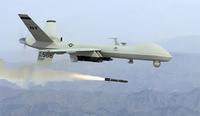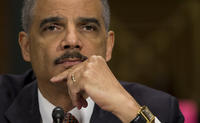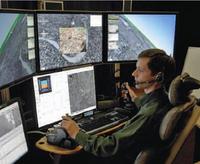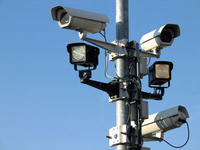-
Second NSA domestic surveillance scheme revealed: data mining from nine U.S. ISPs

A day after it was revealed that the NSA was collecting communication information on millions of Verizon’s U.S. customers, another NSA domestic surveillance scheme was exposed: the NSA and the FBI have been tapping directly into the central servers of nine leading U.S. Internet service providers for the purpose of harvesting audio, video, photographs, e-mails, documents, and connection logs. The information collected allowed intelligence analysts to track an individual’s movements and contacts over time.
-
-
NSA collecting information on Verizon customers’ communications
The National Security Agency (NSA) has been collecting massive amounts of “metadata,” or transactional information, on millions of Verizon’s U.S. customers. A court granted the NSA permission to begin information collection on 25 April, stipulating the collection must end by 19 July. The court order instructs Verizon to “continue production on an ongoing daily basis thereafter for the duration of this order.” It specifies that the records to be produced include “session identifying information,” such as “originating and terminating number,” the duration of each call, telephone calling card numbers, trunk identifiers, International Mobile Subscriber Identity (IMSI) number, and “comprehensive communication routing information.”
-
-
Sen. Rubio proposes that Congress, not DHS, devise border security plan
Senator Marco Rubio (R-Florida), a member of the bipartisan group which drafted the immigration bill which passed the Senate Judiciary Committee and which will be brought to the floor of the Senate next week, is working on a proposal which will dramatically change the approach to devising and assessing border security in the bill. The bill now has DHS entrusted with the responsibility of devising a border security plan and determining whether the plan has been adequately implemented. Rubio proposes that Congress would assume these responsibilities, saying that the current plan for borer security is not robust enough to convince many Republican lawmakers to support the immigration bill.
-
-
Former CIA chief: NYPD surveillance would have prevented Boston-like attacks

Former CIA director Michael Hayden said a terror attack like the Boston Marathon bombings would never have taken place in New York City. Hayden, who also headed the National Security Agency (NSA), said the New York Police Department’s (NYPD) broad campaign of spying on the Muslim communities in the city would have helped officials identify the radical tendencies of the alleged bombers, thus preventing the attack.
-
-
Texas Senate bans using drones to take photos, videos without subjects’ permission
Last Sunday the Texas State Senate passed, by a 26-5 vote, a law banning citizens from using drones to take photographs or videos. The legislation will make using a drone to take photos or videos of people without their permission a Class C misdemeanor, which could lead to a $500 fine. Distributing photos or videos taken from a drone will be a Class B misdemeanor, and civil liabilities could add up to $10,000.
-
-
Firefighters, FAA weighing the use of drones for wildfires
With the wildfire season already claiming land and homes in the Western United States, federal government firefighters are considering the use of drones outfitted with cameras to map out the size and speed of a wildfire.
-
-
New Obama policy sets higher standards for drone use

In a major policy speech Thursday, President Obama announced plans to set higher standards for the use of drones in the fight against terrorists. He defended the use of the unmanned vehicles in that war, however, including when, in extreme situations, they are used to kill American citizens.
-
-
U.S. secretly obtains AP phone records to identify source of story

In what the AP calls a “massive and unprecedented intrusion” into the news organization’s news work, the U.S. Justice Department secretly gathered two-months-worth of telephone records of the agency’s reporters and editors. The AP says the records listed incoming and outgoing calls to the offices and homes of reporters and editors. The Justice Department began collecting the phone records in order to identify the source or sources of a 7 May 2012 AP story which detailed a secret CIA operation in Yemen to intercept an al Qaeda-sponsored attempt to load an IED onto a U.S.-bound airplane.
-
-
U.S. considering revamping wiretap laws
The White House is reviewing an FBI plan to overhaul surveillance laws in order to make it easier for law enforcement officials to wiretap citizens using the Internet to communicate rather than phone services.
-
-
Master “remote” control for all military unmanned systems

Historically, unmanned systems have been developed and fielded as individual items built by different vendors, which has led to increased spending, from $284 million in 2002 to more than $3 billion in fiscal year 2010. Researchers have developed something similar to a master remote control for separate components of differing brands of entertainment systems: it is called the Common Control System, and it will control military ground, air, and undersea unmanned systems across the services.
-
-
Canadian company provides software to U.S. intelligence agencies
A Canadian company has spent the last few years locking up contracts to provide security software to U.S. federal agencies such as the NSA, CIA, and FBI. The company moved from the United States to Canada because the Canadian government gives tax credits for high-tech companies coming to Canada, and Canadian government agencies help the company break into new markets by sponsoring his company in international conferences. It was in one of these conferences that he once met “some NSA folks.”
-
-
Privacy, cost concerns check drive for more surveillance cameras

Law enforcement agencies in cities across the United States are campaigning to increase surveillance on city streets, impressed with the effectiveness of video surveillance in helping the Boston Police identify the two suspects in the Boston Marathon bombings. This campaign to expand law enforcement’s surveillance power is likely to run into stiff opposition, as Americans have proven suspicious of allowing the government powers which would infringe on privacy. Expanding surveillance networks also costs money, and these are tight budgetary times.
-
-
Central Washington State proposed for a UAV research and testing site
The FAA Modernization and Reform Act of 2012 enacted by Congress calls for establishing six unmanned aircraft system research and testing sites in the United States. A consortium of Washington State-based organizations will soon submit the final section of a proposal to site an unmanned aircraft system research and testing facility in central Washington. If successful, the proposal to the Federal Aviation Administration (FAA) will result in the FAA naming the Pacific Northwest Unmanned Aerial Systems Flight Center as one of six U.S. testing facilities later this year.
-
-
Immigration reform conditioned on border being secured by unmanned vehicles
Between 2006 and 2011, CBP spent $55.3 million on drone use and maintenance operations, according to a DHS Inspector General (IG) report. The IG recommended that the agency stop buying drones because the aircrafts are costly to maintain and have flown significantly less than their predicted flight times. The bipartisan immigration proposal drafted by the bipartisan Gang of Eight includes a provision which would create a 24/7 border surveillance system heavily dependent on the use of drones.
-
-
Tamerlan Tsarnaev's name was on U.S. terror watchlist since 2011

In March 2011, after being contacted by the Russian security services, the CIA added the name of Tamerlan Tsarnaev to the U.S. government’s terror watchlist. DHS secretary Janet Napolitano said that Tamerlan’s travel to Dagestan, and his arrival back in the United States, were “pinged” by the department. Leading lawmakers have raised questions about whether the U.S. intelligence community and law enforcement agencies have dropped the ball on the Tsarnaev brothers.
-
- All
- Regional
- Water
- Biometrics
- Borders/Immig
- Business
- Cybersecurity
- Detection
- Disasters
- Government
- Infrastructure
- International
- Public health
- Public Safety
- Communication interoperabillity
- Emergency services
- Emergency medical services
- Fire
- First response
- IEDs
- Law Enforcement
- Law Enforcement Technology
- Military technology
- Nonlethal weapons
- Nuclear weapons
- Personal protection equipment
- Police
- Notification /alert systems
- Situational awareness
- Weapons systems
- Sci-Tech
- Sector Reports
- Surveillance
- Transportation
Advertising & Marketing: advertise@newswirepubs.com
Editorial: editor@newswirepubs.com
General: info@newswirepubs.com
2010-2011 © News Wire Publications, LLC News Wire Publications, LLC
220 Old Country Road | Suite 200 | Mineola | New York | 11501
Permissions and Policies
Editorial: editor@newswirepubs.com
General: info@newswirepubs.com
2010-2011 © News Wire Publications, LLC News Wire Publications, LLC
220 Old Country Road | Suite 200 | Mineola | New York | 11501
Permissions and Policies
